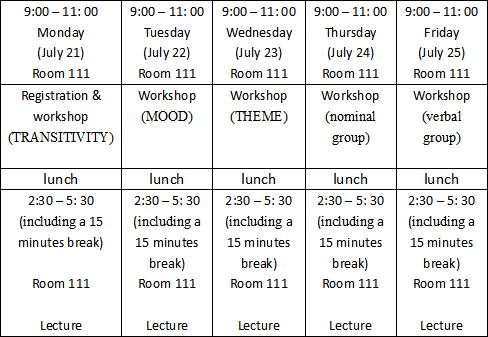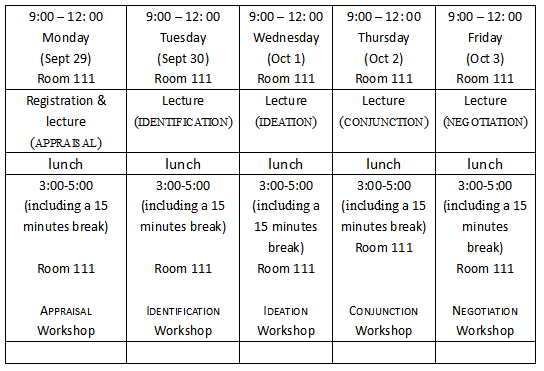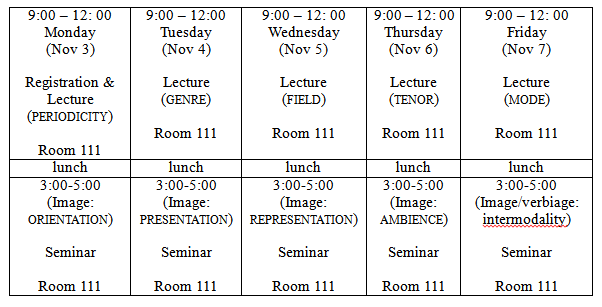Intensive courses in Systemic Functional Linguistics 2014
1 System and structure (axial relations) July 21-25
2 Discourse semantics September 29-October 3
3 Context (register, genre and multimodality) November 3-7
As part of its mission, the Martin Centre for Appliable Linguistics provides advanced training in Systemic Functional linguistics and Semiotics for research students and post-doctoral fellows. In 2014 it is offering a series of three advanced seminars.
This seminar series is designed to provide specialised training in Systemic Functional Linguistics and Semiotics – especially designed for (and restricted to) PhD candidates and post-doctoral fellows doing research in SFL/S. Participation is by invitation only on the recommendation of selected PhD supervisors. The training will be conducted by Professor J R Martin of the University of Sydney, with the assistance of Martin Centre staff, in three intensive 5 day sessions. Participants must commit to attending all three weeks of training, as weeks 2 and 3 assume the training from the previous session/s. Coursework will be assigned, and participants will receive certification for the course. In addition, reading and study tasks will be assigned in preparation for each training session. A strong foundation in Halliday’s Introduction to Functional Grammar, to the level of its 2nd edition, will be assumed.
An outline of the program and readings for 2014 is provided below.
Research Student Symposia, 2014
Martin Centre, Shanghai Jiao Tong University
Saturday July 26, October 4 and November 8
Following each intensive course, a 1-day research student symposium will be organised, providing an opportunity for course participants to present papers on their own research. All course participants are expected to attend these symposia. As part of their application to the intensive courses participants will include an abstract for a presentation at one of these events. Martin Centre staff will then organise the symposia thematically in relation to participants’ research. Selected papers from these symposia will be edited by Martin Centre staff for publication in a dedicated e-journal or the Journal of Contemporary Foreign Language Studies.
Intensive course 1: System and structure (axial relations)
In this course we explore the formalisation of system and structure in SFL, focusing on grammatical relations. In the morning sessions we will review Halliday’s descriptions of transitivity, mood, theme, nominal group and verbal group in English, drawing on the exercises in Deploying Functional Grammar (students will need to bring a copy of this book to class). In the afternoon sessions we will work on system/structure relations in SFL and their formalisation in system networks and realisation rules, drawing on SFG: a next step into the theory. As background reading all students should review an edition of Halliday’s Introduction to Functional Grammar and study carefully SFG: a first step into the theory.
Deploying Functional Grammar. Commercial Press: Beijing (J R Martin, C M I M Matthiessen, C Painter). 2010.
Systemic Functional Grammar: a next step into the theory – axial relations. (J R Martin; Chinese translation and extensions by Wang Pin & Zhu Yongsheng). Beijing: Higher Education Press. 2013.
Systemic Functional Grammar: a first step into the theory. (C M I M Matthiessen & M A K Halliday). Beijing: Higher Education Press. 2009.

Intensive course 2: Discourse semantics
In this course we explore discourse semantics, focusing on the systems of appraisal, indentification, ideation, conjunction and negotiation. In the morning session we will review Martin’s proposals for this systems and their realisation in discourse, drawing on Working with Discourse. In the afternoon sessions we will practice using these systems to analyse texts from a range of registers and genres. As preparation all students should review the papers in Discourse Semantics and study carefully Chapters 2, 3, 4, 5 and 6 from Working with Discourse.
Working with Discourse: meaning beyond the clause (J R Martin & David Rose) London: Continuum. 2003. 293pp. [reprinted by Peking University Press 2007; 2nd edition Continuum. 2007 – to be reprinted by Peking University Press in 2014.
Discourse Semantics. Vol. 2 in the Collected Works of J R Martin (Wang Zhenhua Ed.). Shanghai: Shanghai Jiao Tong University Press. 2010.

Intensive course 3: Context (register, genre and multimodality)
In this course we explore context, from the perspectives of register and genre, and multimodality (focussing on the grammar of images). In the morning sessions we will review Martin’s proposals for the systems of periodicity, genre, field, tenor and mode. In the afternoon sessions we introduce SFL work on orientation, presentation, representation and ambience in images, and the challenge of exploring intermodality. As preparation all students should review the papers in Genre Studies and Register Studies, carefully read Genre Relations and Reading Images, and chapters 2 and 5 of Reading Visual Narratives.
Genre relations: mapping culture. (J R Martin & David Rose). London: Equinox. 2008.
Genre Studies. Vol. 3: Collected Works of J R Martin (Wang Zhenhua Ed.). Shanghai: Shanghai Jiao Tong University Press. 2012.
Register Studies. Vol. 4: Collected Works of J R Martin (Wang Zhenhua Ed.). Shanghai: Shanghai Jiao Tong University Press. 2012.
Reading Images: the grammar of visual design (G Kress & T van Leeuwen). London: Routledge. 2006.
Reading Visual Narratives: image analysis of children’s picture books (Clare Painter, J R Martin & Len Unsworth) London: Equinox. 2013.







